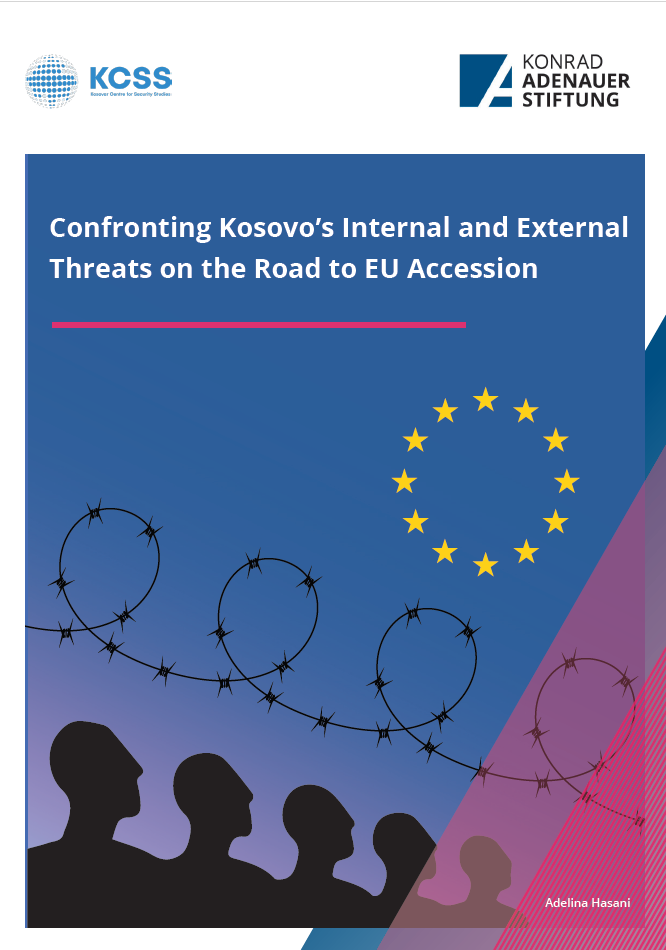13/11/2024

Konrad Adenauer Foundation (KAS) in Kosovo
Konrad Adenauer Foundation (KAS) in Kosovo
Adelina Hasani
This report addresses Kosovo’s national security challenges, analyzing them from both local and international perspectives within the framework of the European Union. It explores the perceptions of Kosovo citizens on national security and the potential impact of EU integration on the country’s security landscape. Drawing on recent survey data, the report examines how citizens view the role of EU mechanisms in enhancing Kosovo’s national security and assesses the effectiveness of national institutions in responding to current security threats.
Kosovo’s national security is heavily influenced by its unresolved conflict with Serbia, while the latter still refuses to recognize Kosovo’s independence. Serbia actively undermines Kosovo’s international standing by lobbying against its membership in organizations such as INTERPOL and UNESCO. This resistance not only weakens Kosovo’s national security and hinders its full integration into the international system, but also obstructs its progress toward EU membership.
The resurgence of ethno-political nationalism poses a significant security threat in Kosovo. Ongoing ethnic tensions between the Albanian majority and the Serbian minority, particularly in the northern part of Kosovo, continue to undermine national stability. Ethno-political nationalism, which fueled the Balkan conflicts of the 1990s, remains a destabilizing force. In Kosovo, unresolved post-war issues, such as Serbia’s denial of war crimes and the lack of transitional justice, have allowed radical ideologies to persist.
For Kosovo, membership in the European Union is not only a matter of political and economic integration but also a critical component of its national security strategy. Joining the EU is seen as vital for fostering stability through the promotion of the rule of law, democratic governance, and human rights, all of which are essential for building a secure and resilient state capable of addressing internal and external threats. According to the September 2024 Omnibus Survey, 59.5% of respondents consider EU membership crucial for ensuring Kosovo’s national security.
The Banjska terrorist attack in September 2023, which resulted in casualties and heightened the risk of inter-ethnic conflict, represents the most serious security threat to Kosovo since its independence. This attack not only further strained relations between Kosovo and Serbia, but also jeopardized the EU-facilitated dialogue and the broader stability of the Western Balkans.
Russia has played a significant role in destabilizing the Western Balkans, mainly by use of disinformation campaigns to exploit ethnic tensions in Kosovo. Russia’s refusal to recognize Kosovo’s independence and its propaganda efforts in the region, aimed at discrediting Kosovar institutions and fostering anti-Western sentiment, pose serious challenges to Kosovo’s security.
While the EU integration process is widely recognized as crucial for enhancing Kosovo’s national security, the September 2024 Omnibus Survey revealed mixed opinions on the effectiveness of EU mechanisms in addressing security threats. Respondents were presented with five options, ranging from complete satisfaction (1) to total dissatisfaction (5). Only 7.1% believe the EU is fully addressing these concerns, 16.7% gave slightly positive ratings (2 out of 5), 29.6% rated the performance as moderate (3 out of 5), and the largest group, 38.2%, expressed dissatisfaction (4 out of 5). Meanwhile, 8.4% feel the EU is not addressing security issues at all, and an additional 10.8% were unsure or declined to respond.
The views expressed in this paper are those of the author and do not necessarily reflect the views of Konrad-Adenauer-Stiftung. This publication of the Konrad-Adenauer-Stiftung is solely intended for information purposes. It may not be used by political parties or by election campaigners or supporters for the purpose of election advertising.